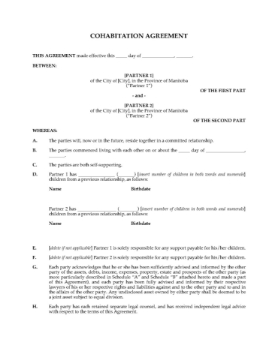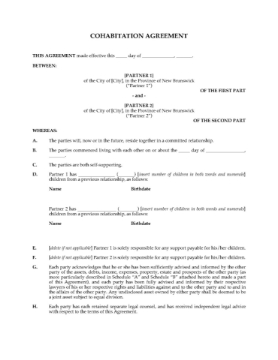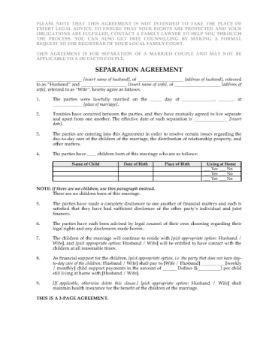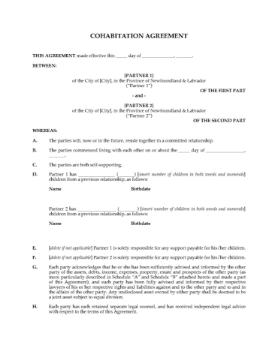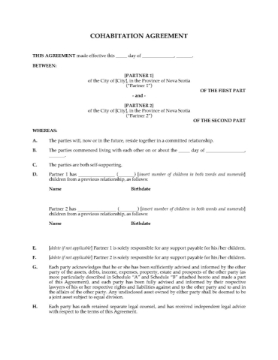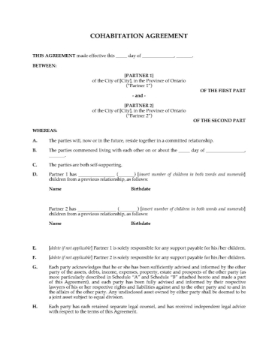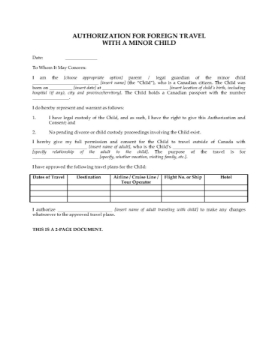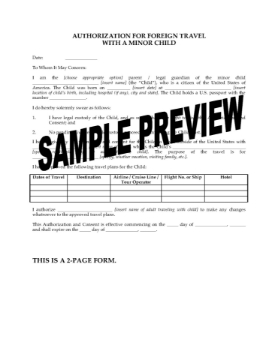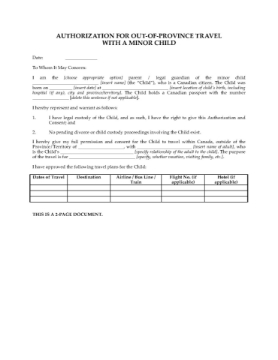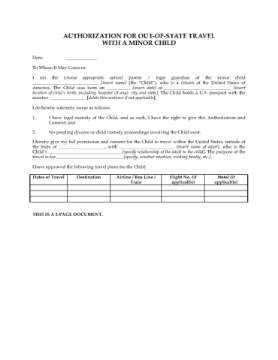Marriage and Family Law
Draw up prenuptial, custody, maintenance agreements, separation, cohabitation and matrimonial property agreements with these Marital and Family Law Forms.
Marital and family law encompasses a range of legal agreements and documents, including prenuptial agreements, custody agreements, maintenance agreements, separation agreements, cohabitation agreements, and matrimonial property agreements.
These forms are essential for clearly establishing the rights and responsibilities of each party in various domestic relationships and situations.
What types of legal matters are classified as "family law"?
Family law is a specialized area of law that addresses legal issues arising from domestic and family relationships. It covers a wide array of matters, such as:
- Matrimony and civil unions (domestic partnerships)
- Divorce and separation
- Support and maintenance arrangements
- Custody and visitation rights
- Spousal and child abuse cases
- Adoption and foster care matters
- Guardianship
- Paternity issues
Cohabitation and Prenuptial Agreements
A cohabitation agreement, sometimes referred to as a "living together agreement," outlines each partner's rights and responsibilities concerning jointly owned property, child support and maintenance, debt repayment, and other important issues, in order to clarify the ownership of property and assets at the outset of the relationship, as well as to define how these will be handled if the relationship ends.
A prenuptial agreement covers many of the same issues, but is made between two parties who are planning to marry and wish to establish ownership of their respective assets prior to marrying, in the event that the marriage fails.
Using These Downloadable Template Forms
Our Marriage and Family Law Forms are downloadable, fully editable legal documents that contain instructions to help you navigate your way through the process. Some of the forms contain notices to users that they must obtain independent legal advice before signing them.
These forms were not generated by AI. They have been written and reviewed by legal professionals.
Manitoba Cohabitation Agreement
Manitoba law treats common law relationships of 3 years or longer the same as legal marriage, and you could end up losing all or part of your separately owned assets if you separate. You should consider signing a Manitoba Cohabitation Agreement.
- The purpose of a Cohabitation Agreement is to determine who owns what, how jointly owned property will be distributed if the relationship ends, and what each partner's responsibilities are to raise and support their children.
- Whatever assets a partner brought into the relationship will continue to belong to that partner. The other person has no ownership interest in them.
- Any assets that were purchased jointly during the relationship would be divided equally between the partners if they decide to break up.
- Both parties are responsible for raising and caring for the children they have together.
- You must both get independent legal advice from a lawyer before you sign. The document includes a Certificate of Independent Legal Advice for the lawyer to sign after seeing you.
- Available in MS Word format.
- Intended to be used only in the Province of Manitoba, Canada.
New Brunswick Cohabitation Agreement
The New Brunswick Marital Property Act does not apply to common law couples unless they have signed a domestic contract. That's why you and your partner need to sign a Cohabitation Agreement.
- This Agreement sets out each partner's legal rights and obligations with respect to child support, estate rights and jointly and separately owned property.
- Each partner continues to own the assets he/she brought into the relationship, and any assets acquired during the relationship are jointly owned by both partners.
- Each partner is solely responsible for his/her own debts and financial obligations.
- The partners agree to jointly raise and support the children they have together.
- Each partner waives any right to any inheritance left to the other partner by a will or under the laws of succession.
- This document comes with a Certificate of Independent Legal Advice for each partner. You must see a lawyer and get independent legal advice before you sign the Agreement.
- Intended for use only in the Province of New Brunswick, Canada.
New Zealand Separation Agreement
Have you and your spouse decided to separate? Put the terms of the separation in writing with this New Zealand Separation Agreement.
- Provisions of the Agreement include:
- which party the children of the marriage (if any) will reside with - this party will also retain temporary possession of the family residence;
- the amount of financial support to be paid by the parent who does not have day-to-day care of the children;
- payment of joint debts;
- neither party will incur any further debt on joint credit of the parties;
- division of jointly owned property;
- ownership of separate property;
- payment of expenses related to the family residence;
- each party releases all claims or demands on the other party's estate.
- Available in MS Word format, fully editable and easy to use.
- Intended to be used only in New Zealand.
Newfoundland Cohabitation Agreement
Common law couples do not have the same rights as married couples under Newfoundland law. To make sure your rights are protected, you need to sign a Cohabitation Agreement.
- A cohabitation agreement is permitted under the Family Law Act. It gives you and your partner the opportunity to set out in writing what your rights and obligations to each other are.
- You can decide what happens to assets that the two of you purchase jointly, if the relationship comes to an end.
- The agreement sets out what each partner's responsibilities will be with respect to raising and caring for the children, and paying the household debts.
- Since common law spouses do not have matrimonial property rights under provincial law, this agreement covers that as well.
- Both partners must get independent legal advice from a lawyer before signing the agreement. The form includes a Certificate of Independent Legal Advice that the lawyer must complete.
- Available in MS Word format.
- For use only in the Province of Newfoundland and Labrador.
Nova Scotia Cohabitation Agreement
In Nova Scotia common law couples can register as domestic partners, which gives you some of the same rights as a married couple. For best protection, you should have a Cohabitation Agreement in place.
- The Agreement allows you and your partner to specify which assets each of you owned prior to the relationship, and which are jointly owned by both of you.
- You can also set out how your joint assets will be distributed if you decide to end the relationship.
- You can also agree upon how household expenses will be split, and who is responsible for other debts. For instance, if your partner owes money on a student loan incurred before you met, he/she may be solely responsible for paying it off.
- If the two of you decide to get married, the Cohabitation Agreement becomes a prenuptial (pre-marriage) agreement.
- Before signing this Agreement, you and your partner must each get independent legal advice from a lawyer. The form includes a Certificate of Independent Legal Advice for each party.
- Available in MS Word format, fully customizable.
- For use only in the Province of Nova Scotia, Canada.
Ontario Cohabitation Agreement
Cohabiting couples in Ontario can establish their rights and obligations and the ownership of their separate and joint property in a Cohabitation Agreement.
- The Agreement allows you and your partner to specify which assets each of you owned prior to the relationship, and which are jointly owned by both of you.
- You can also set out how your joint assets will be distributed if you decide to end the relationship.
- You can also agree upon how household expenses will be split, and who is responsible for other debts. For instance, if your partner owes money on a student loan incurred before you met, he/she may be solely responsible for paying it off.
- If the two of you decide to get married, the Cohabitation Agreement becomes a prenuptial (pre-marriage) agreement.
- You will both need to get independent legal advice from a lawyer before you sign the Agreement. A Certificate of Independent Legal Advice is included for each of you, which the lawyer will sign after seeing you.
- Ontario law treats married and cohabiting couples differently with respect to property rights. Make sure yours are protected.
- Available in MS Word format, fully customizable.
Parental Authorization for Foreign Travel with Minor | Canada
If your child is going to travel outside of Canada with another adult, you will need to give your consent with a Parental Authorization Form for Foreign Travel with a Minor Child.
- This form can only be used by Canadian residents.
- The parent or guardian authorizing the trip must have legal custody of the child.
- You must attest that there no divorce or custody proceedings in process that would affect your legal custody.
- This is a downloadable and customizable legal form which can be re-used as often as you require.
Parental Consent for Foreign Travel with Minor Child | USA
Give written consent for your child to travel outside of the United States in the company of another adult with this Parental Consent form for minor children.
- This form can only be used by U.S. residents.
- The parent or guardian authorizing the trip must swear that he/she has legal custody of the child.
- The parent/guardian must also attest that no divorce or custody proceedings are pending that would involve the child.
- The form must be acknowledged in front of a Notary Public.
- This is a downloadable MS Word template which can be re-used as often as you require.
Parental Consent for Travel with Minor Child | Canada
Give written consent for your child to travel within Canada in the company of another adult with this Parental Consent and Authorization form.
- This form is only valid for travel within the provinces and territories of Canada.
- The parent or guardian consenting to the travel represents that he/she has legal custody of the child.
- The parent/guardian must also attest that no divorce or child custody proceedings are pending with respect to the child.
- The parent / guardian states that s/he is giving consent of his/her own free will.
- This Parental Authorization for Travel with Minor Child is a legal document that proves the adult traveling with the child has your permission. Failure to produce it upon request could result in delays, cancellations, and even arrest.
- Available in MS Word format. Use it as often as necessary.
Parental Consent for Travel with Minor Child | USA
Give written consent for your child to travel outside your city or state of residence in the company of another adult with this USA Parental Consent form.
- The parent or guardian authorizing the trip must swear that he/she has legal custody, and that no divorce or child custody proceedings are pending.
- The form must be acknowledged in front of a Notary Public.
- This authorization form is only valid for travel within the United States.
- Available in MS Word format. Easy to fill in, edit and print.





